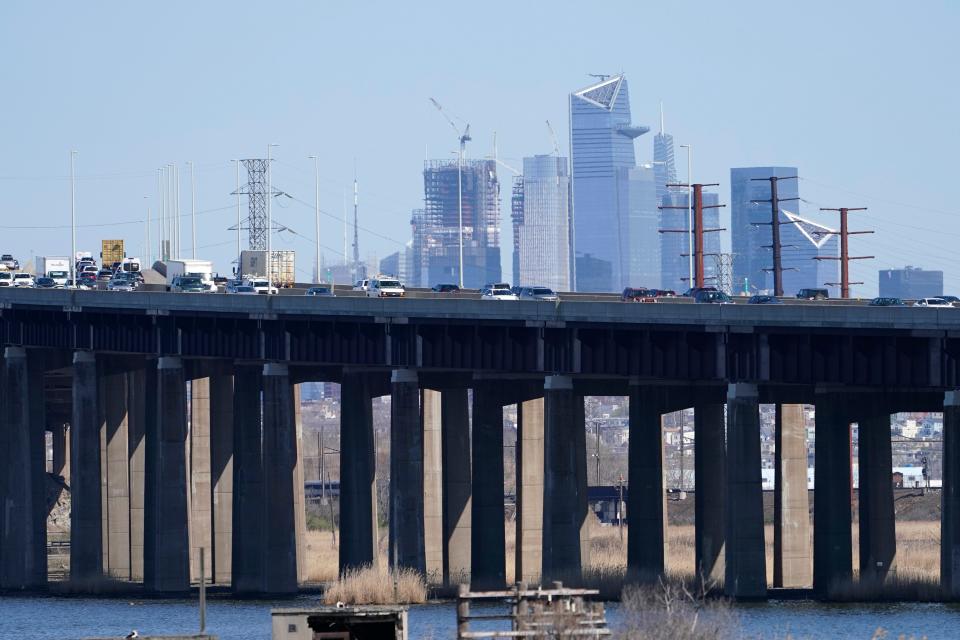Senate Republicans propose $568 billion infrastructure plan to counter Biden
WASHINGTON — Senate Republicans unveiled a $568 billion infrastructure plan Thursday limited to roads, bridges, broadband and other physical infrastructure, countering President Biden's American Jobs Plan with a framework around one-quarter the size of his sweeping $2.25 trillion package.
The counteroffer illustrates the vast gulf between Republicans and Democrats as Biden and lawmakers negotiate an infrastructure bill.
Although their plan doesn't specify how to pay for the spending, Republicans suggested new user fees, resisting a corporate tax rate increase pushed by Biden and keeping former President Donald Trump's 2017 tax cuts intact.
Republicans have slammed Biden's proposals for $400 billion to boost caregiving for the elderly and disabled, $174 billion for electric vehicle stations and $300 billion for manufacturing, among other areas, arguing Democrats want to use the popularity of infrastructure to fund unrelated liberal priorities in the same package.

A framework led by Sen. Shelley Moore Capito, R-W.Va. wouldn't cover any such items, including those aimed at fighting climate change, instead focusing solely on transportation projects, broadband infrastructure and water pipes.
"Let’s be clear, @potus’ proposal goes beyond what constitutes infrastructure," Capito, ranking member of the Senate's Environment and Public Works Committee, said in a tweet. "Today, we set a clear path forward on core principles that DEFINE infrastructure & address our country’s needs."
Backed by Senate Minority Leader Mitch McConnell, the counteroffer is also supported by Sens. Roger Wicker, R-Miss., Pat Toomey, R-Pa., Mike Crapo, R-Idaho, and John Barrasso, R-Wyo. Sen. Mitt Romney, R-Utah, called the plan a "responsible, solid step forward" and asked the Biden administration "find common ground and meet us at the negotiating table."
White House press secretary Jen Psaki said the president views the Republican plan as a valid starting point for negotiations.
"The president has said from the beginning that he would accept any good-faith effort to find common ground because the only unacceptable step would be inaction," she said. "We're looking forward to reviewing the details of the proposal."
Psaki said Biden would invite lawmakers to the White House for negotiations shortly after his speech to a joint session of Congress on Wednesday.
Biden has framed his American Jobs Plan as a "once-in a generation investment" that would be the country's largest jobs program since World War II and position the U.S. to compete economically with China. The White House has broadened the traditional definition of infrastructure to include "human infrastructure," arguing a transformation in caregiving, for example, is needed to enable more women to work.
Biden has said he's willing to listen to all ideas, including those from Republicans, but has spoken against creating or raising user fees, arguing it would put the tax burden on working-class Americans.
More: Roads, bridges ... and caregivers? Why Biden is pushing a 'radical shift' to redefine infrastructure
Psaki confirmed Biden next week will unveil his American Families Plan – the second piece of his "Build Back Better" agenda – expected to include investments in child care, paid leave, pre-kindergarten and education. It will cost around $1.5 trillion, the Washington Post and New York Times reported, paid for by tax increases on the wealthiest Americans.
Psaki declined to discuss specifics, but reiterated Biden's pledge that no one earning less than $400,000 would pay more in taxes under the plan.
"That will certainly be reflected in the proposal he makes next week," she said.

The Republican plan unveiled Thursday would fund infrastructure upgrades over the next five years, a smaller window than Biden's eight-year plan.
Republicans proposed $299 billion for upgrades to roads and bridges, vastly more than the $115 billion proposed in Biden's plan, and $44 billion on airport renovations, more than the $25 billion outlined in Biden's plan.
But the GOP plan would spend far less in most other areas. Republicans proposed $61 billion for public transit systems and $20 billion for rail, compared to Biden's proposal for $85 billion for transit and $80 billion for Amtrak improvements and expansion.
Republicans want $65 billion for broadband infrastructure, significantly less than the $100 billion proposed by Biden. Republicans suggested $35 billion for drinking water and wastewater, compared to $111 billion proposed by Biden for clean drinking water, including the replacement of all lead pipes and service lines.
The Republican plan wouldn't fund repairs for VA hospital, clinics or schools buildings, nor would it pay for caregiving expansion, research and development, manufacturing and a host of other measures outlined in Biden's proposal.
The full spending breakdown proposed by Republicans is the following:
Roads and Bridges – $299 billion
Public Transit Systems – $61 billion
Rail – $20 billion
Safety – $13 billion
Drinking Water and Wastewater Infrastructure – $35 billion
Inland Waterways and Ports – $17 billion
Airports – $44 billion
Broadband Infrastructure– $65 billion
Water Storage – $14 billion
Biden and Democrats could seek to pass the American Jobs Plan with a simple majority in the Senate via budget reconciliation, blocking any attempt at a filibuster waged by Republicans. It would mean no Republican votes would be needed as long as Democrats are all on board, mirroring how Biden won approval of his $1.9 trillion COVID-19 rescue plan last month.
Ten Republicans met with Biden in the White House during talks on the rescue plan after they proposed a trimmed down $618 billion package. But those talks quickly stalled after Biden wouldn't budge on reducing its size.
Reach Joey Garrison on Twitter @joeygarrison.
This article originally appeared on USA TODAY: Senate Republicans propose infrastructure plan in counter to Biden

 Yahoo Movies
Yahoo Movies 